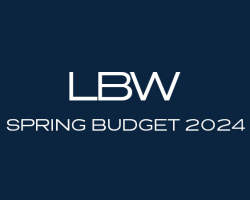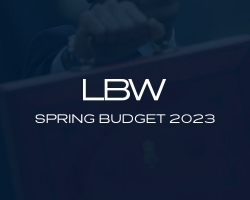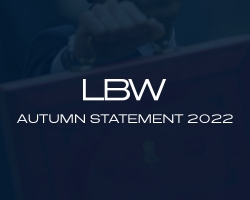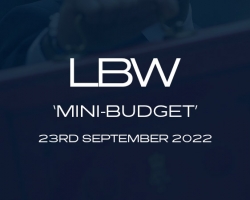Latest News
LBW - Autumn Budget 2017
Philip Hammond today delivered his first Autumn Budget (and second Budget speech).
The Budget speech itself included a multitude of plans to provide funding in an attempt to make Britain “fit for the future”. These include;
- New funding for the NHS as well as support for broadband and artificial intelligence infrastructure.
- The construction of new homes (including specifically the teaching of construction skills).
- Increasing payment for transport infrastructure in parts of the UK.
- More money is to be made available for Scotland, Wales and Northern Ireland to be spent by reference to each devolved administrations remit.
The majority of the announcements in the Budget speech related to spending primarily for the matters referred to above and the tax raising matters where quite limited in number as you will see below.
We are as usual detailing below some of the more salient taxation features which we believe will be of interest to you.
Personal Taxes, National Insurance and Pay
Personal allowances are to rise to £11,850 in 2018/2019 and the target of increasing this allowance to £12,500 by 2020 remains. Furthermore, the threshold at which higher rate tax commences will increase to £46,350 by 2018/2019 again as part of the target to increase this threshold to £50,000 by 2020.
The new National Living Wage for the over 25’s will rise to £7.83 from April 2018 whilst there will be increases in the National Minimum Wage as follows;
|
Year |
21 to 24 |
18 to 20 |
Under 18 |
Apprentice |
|
From April 2018 |
£7.38 |
£5.90 |
£4.20 |
£3.70 |
There were no specific announcements regarding any changes in National Insurance limits and levels and consultation on the reform of the National Insurance system is ongoing.
Without providing specific details the Chancellor indicated that he would be introducing a new increased Enterprise Investment Scheme relief. However, this will be targeted to activities involving knowledge intensive companies rather than some of the more safe investments (after all EIS is intended as a high risk investment).
It has previously been announced that a 30 day payment window for paying capital gains tax on residential property would apply in 2019. This has now been deferred until 2020.
There is no change in the starting rate for savings or the ISA annual subscription limits. However, the pension lifetime allowance has increased to £1,030,000.
Off-payroll working rules
There had been rumours that the regulations introduced in April 2017 for individuals working for public sector bodies through their own Limited Company would be mirrored in the Private Sector. Again, there were no announcements made regarding this, other than, the matter is still under consultation with further announcements expected next year.
Business Tax and VAT
The proposed phased reduction in the rate of corporation tax down to 17% by 2020 is to remain on course.
As previously announced, a new VAT flat rate of 16.5% was introduced in April 2017.
The other significant announcement regarding VAT was the freezing of the £85,000 VAT registration threshold for the next 2 years. This threshold had regularly increased over many years and this is the first freezing of this threshold. It had been rumoured that as the UK has the highest starting point for VAT registration in the OECD that this threshold would have reduced. The Chancellor took note of the various representations made and further announcements are expected once full consultation has been concluded with a view to changing the VAT threshold but also having in mind the ‘cliff edge nature’ of the compulsory requirement to register for VAT that the present system exhibits for many smaller traders.
One of the anomalies with Capital Gains Tax is the fact that whilst indexation allowance which effectively provides measure of relief for price increases caused by inflation was abolished for individual tax payers in 1998, the relief continued to be available for Limited Companies. With effect from January 2018 this relief is frozen thus any relief available to that date will still be available but any gains arising due to inflation after that date will no longer be relieved.
The Chancellor introduced a new withholding tax (with effect from April 2019) to be paid by multinationals that hold intellectual property in low tax jurisdictions and who remit profits to that low tax jurisdiction by way of royalties and similar other payments. The withholding tax is to be paid on any royalties paid in respect of UK sales which would reduce the liability to UK corporation tax.
Motor Vehicles
The Chancellor announced investment to assist with driverless cars as well as providing money to assist in the purchase of battery electric cars. This includes the inclusion of the “right cabling” for electric car charge points in all new homes being built as well as legislating to ensure that no benefit in kind will arise to employees who use their employer’s electric car charging points.
The campaign against higher polluting diesel cars continues. Vehicle excise duties are to increase and for certain diesel cars, the 3% premium on benefit in kind tax rates will be increased by an additional 1%. These measures will only apply to cars implying commercial vehicles are not impacted.
Finally, on the matter of motor vehicles, fuel duty is to remain frozen for a further year.
Housing
The ‘big giveaway’ towards the end of his speech was the abolition of Stamp Duty Land Tax in England to ALL first time buyers up to the first £300,000 of cost. A measure of additional relief will be available to those first time buyers purchasing a property in high price areas including London where the first £300,000 of properties costing up to £500,000 will also be eligible for the relief (Full details of how the relief operates will be made available shortly).
The Chancellor also announced that action will be taken in circumstances where planning permissions are applied for and granted but no work undertaken in an attempt to prevent land being withheld from the market for commercial rather than technical reasons. This could involve direct intervention using compulsory purchase powers.
The Taxation of Dividends
As has been previously mentioned, the new rules on the taxation of dividends are now applying. The only significant change is that with effect from 6 April 2018 the first £2,000 will be subject to the 0% rate of tax as opposed to the first £5,000 which is currently available at this rate.
And finally.....
As we have always maintained, with all matters referred to in the Chancellors announcements the “devil will be in the detail” and the full impact and understanding of all the announcements will not be made clear until the full parliamentary process has been undertaken and the proposals become law in the relevant finance act. We will issue further notices should any matters of significance be announced.
Last modified on




